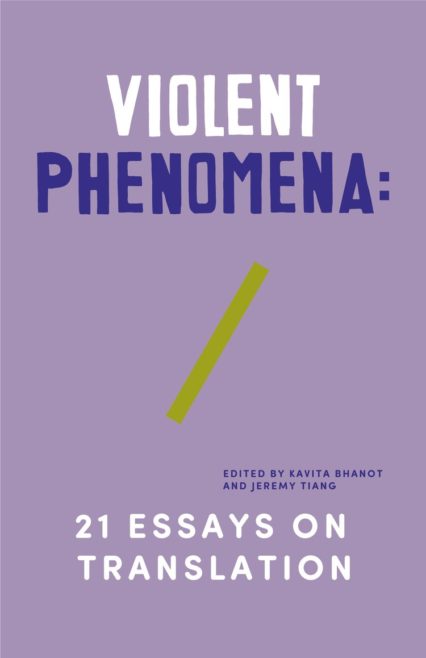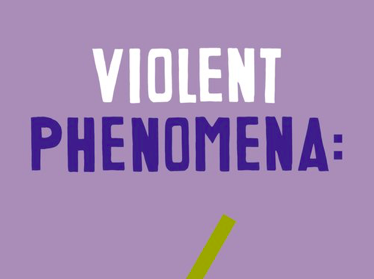Ahead of the July publication of Violent Phenomena: 21 Essays on Translation edited by Kavita Bhanot and Jeremy Tiang, Wales Arts Review is delighted to share an extract from contributor Eluned Gramich who writes on some of her first experiences becoming better acquainted with the richness of Welsh history and, subsequently, her own personal identity.
“To those of us who speak the Welsh language, that is Cymraeg, there is no such entity as Wales. This land in which we live is Cymru.” – Cymru or Wales?, R. S. Thomas
Knowledge of Welsh history, literature, and language is hard won, even for those who live in Wales. It’s an old complaint in Wales that Welsh history is poorly taught in schools (if at all) and Welsh literature, too, is often brushed aside to make way for the English Canon. I’m still learning, slowly, over the years, facts about my own culture that seem almost like secrets.
My ignorance became clear to me in my last year at university. I’d chosen a module in Medieval Welsh, a choice that my course-mates thought distinctly eccentric. (I was the only student in the entire year group who opted for this module.) As part of this, I went on an organised trip with the Celtic department around the ancient sites of the Welsh-English borderland. Marks carved in stone, battered monoliths, cold chapels. There were so few of us that the whole department fit into a 12-seater minibus, and in this bus was a PhD history student I had a crush on. He seemed to know everything, and he spoke a perfect, formal, passionate kind of Welsh while imparting this knowledge to anyone listening.

It was a bright, warm day. There was a tiny pub set in the ruins of an abbey and the men – they were mostly men, the postgraduates in the Celtic department – ordered pints and sat in the tall grass of the abbey grounds and carried on their conversation about Welsh history while I, embarrassed and ignorant, remained silent.
The history PhD said: ‘Why are we always taught about 1066? That date means nothing to us in Wales. Better to learn about 1282, when Llywelyn ein Llyw Olaf was killed. That’s a date that really matters. Or 1537 and 1542,’ he went on, ‘The Acts of Union! When Wales became England and we were all forced to speak the language of the oppressor.’
I sipped my beer, nodding enthusiastically whenever he caught my eye. Yes, he was right. He was so handsome, he had to be. The dates were familiar to me – we had learnt about these ‘Acts of Union’ at school, as a footnote to Henry VIII’s many accomplishments, his consolidation of Tudor power. If you’d asked me earlier, I would have said, well, weren’t the Acts a good thing?
My glass was warm in my hands; we had seen such old, beautiful things, created more than a thousand years ago, but there were no tourists in these small places. I smiled and nodded, but inside I was filled with shame, because in all my twenty-one years it hadn’t once occurred to me that the history I had been taught was English and not ‘British’.
It was a moment of awakening; it placed a question mark on the narrative I had received at school – not just historical, but cultural too. It was almost as though, having been educated in an English secondary school and an English university, I had forgotten my Welshness. Like the audience at the London Book Fair, I didn’t ‘know about Welsh’ and had to learn anew – an ongoing feat of autodidacticism because, as a minority language, information about Welsh history and culture is not as readily available in the national media as English history and culture.
But there is another reason why this day of the ruined abbey has stayed with me over the years. The professor who drove the minibus from one ancient sacred site to the other called me by my nickname – Ned – the name I had been given at my English secondary school and which, for some reason that I’d rather not reflect on, I had decided to take with me to university. The first time he addressed me as ‘Ned’ in front of the Celtic postgraduates, I could see the shock on their faces. And more than that, a kind of shared shame that one of us should choose to anglicise their name to the point of ridicule.
I walked back to my room late at night, tired and slightly drunk, hating myself for having given up so easily and so quickly; for not having detected the power dynamics at play. I understood now that the embarrassment I’d felt because of my name was not because Welsh was unpronounceable, but because monolingual English speakers found it unpronounceable. The frustration over my Welsh name did not come from me – although it had felt that way all my life – the frustration belonged to the English monoglots faced with linguistic difference: having to navigate a name that seemed foreign but was, in fact, the opposite.
Llywelyn ein Llyw Olaf, by the way, died in battle in 1282. His baby daughter, Gwenllian, was kidnapped by the English and taken to a nunnery in Lincolnshire where she grew up having never heard her native tongue. She signed her name Wentlian.
Eluned Gramich is a writer and translator based in Aberystwyth. Her debut novel, Windstill, will be out in November 2022 with Honno.
Violent Phenomena: 21 Essays on Translation edited by Kavita Bhanot and Jeremy Tiang will be released on 28th July via Tilted Axis Press. You can find more information about the collection here.
Violent Phenomena: 21 Essays on Translation











